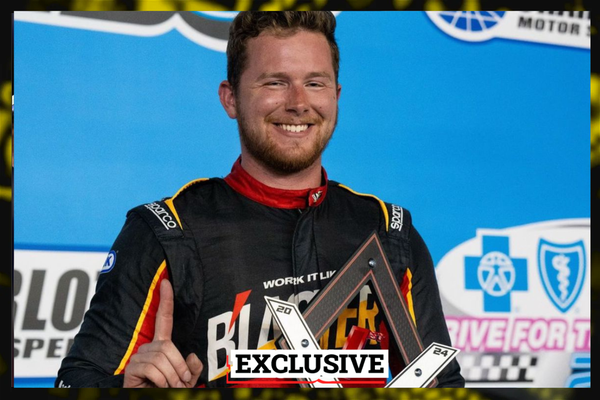

A lot has been said about the charter system. Over the years, NASCAR has evolved from being just a sport to a business proposition, with an elite group of millionaires investing their money. From athletes such as Michael Jordan to artists like Pitbull, the Cup Series has seen tremendous interest from individuals and organizations with deep pockets, so it should come as no surprise that charters are being sold for millions of dollars. Last year, Live Fast Motorsports, co-owned by Matt Tifft and B.J. McLeod sold its charter to Spire Motorsports for a staggering $40 million, the highest ever in NASCAR history.
In an Exclusive chat with EssentiallySports, Live Fast Motorsports co-founder Matt Tifft cited the reasons behind the sale, amidst Stewart-Haas Racing ceasing operations at the end of the 2024 season.
ADVERTISEMENT
Article continues below this ad
The reasons behind record charter sale
The NASCAR world was shocked by the news. Having purchased its charter from Go Fas Racing in 2021 for an estimated $10 million, Live Fast Motorsports had sold its place in the Cup Series for four times the price just three years later. Even though the team was not interested in selling its charter for a long time, they got an offer too good to turn down at a time when the Next-Gen car had completely changed the landscape of Cup Series racing. With the rising operational costs and poor performances on the track, co-founders B. J. McLeod and Matt Tifft felt that the time had come to end their journey at NASCAR’s highest level. And here’s why.
Reflecting on the reasons that resulted in the charter sale, Matt Tifft told EssentiallySports journalist Brahmi Dhaytadak, “What we did not expect in that time period was we knew the Next-Gen car was coming, but in 2021 you know we could go and race in the mid-20s, like 25th and 30th place, and out of a 36 to 40 car field. That’s respectable. You know, there’s a place for us to be in there. We felt like we belonged, but when the Next-Gen car came it was such an investment and we knew that part was there. But what happened was it was such an investment to get your cars better to buy more equipment too.”
For a team that was already struggling, the Next-Gen car didn’t help but proved to be a real blow from a financial sustainability standpoint. With morale at Live Fast Motorsports being at an all-time low, Matt Tifft revealed, “We switched over to ECR engines and joined the Chevy program, and that helped a lot to keep us, you know, a bit more competitive.”
What’s your perspective on:
Is NASCAR becoming a playground for the rich, sidelining passionate racers with deep-pocketed investors?
Have an interesting take?
The team went on to sign Josh Bilicki and Anthony Alfredo, which resulted in a temporary upturn in form, particularly on superspeedways, but the rising costs of maintenance, combined with investors being interested in putting their money into NASCAR, forced Tifft and McLeod to make a hard decision.

via Getty
BROOKLYN, MI – JUNE 08: Matt Tifft, driver of the #2 Nexteer Chevrolet, stands in the garage area during practice for the NASCAR Xfinity Series LTi Printing 250at Michigan International Speedway on June 8, 2018 in Brooklyn, Michigan. (Photo by Jerry Markland/Getty Images)
Recognizing that competing against the Cup Series heavyweights would be impossible given their budget constraints, Matt Tifft exclusively told EssentiallySports, “We need five or six million dollars a year more per year to be competitive. We don’t personally have that, you know, we made our money racing and that’s all we had.” Additionally, given their circumstances, a three-time return on their investment was the best course of action the team’s co-owners could have taken, one that set the standard for future charter sales.
Trending
Has Stewart-Haas Racing been lowballed? Here’s Matt Tifft’s version
Desperate times call for desperate measures. When Stewart-Haas Racing announced that the team would cease operations at the end of the 2024 season, speculation was rife about the potential buyers for their charters in the months ahead. As things stand, Front Row Motorsports is one of the confirmed buyers, having purchased a charter from SHR in the region of $20-$25 million.
ADVERTISEMENT
Article continues below this ad
However, the price cited is significantly lower than the $40 million Spire Motorsports reportedly paid to Live Fast Motorsports just last year. What might be the reasons behind the gap?
Simply put, the market cooled down and teams were unwilling to pay a premium to Stewart-Haas Racing, knowing that the team would shut down its operations at the end of the season. Reflecting on the interest generated by Live Fast Motorsports’ charter sale, Matt Tifft revealed to Brahmi Dhaytadak, “There is massive, massive interest from outside sports figures, investment groups, and all these people trying to break into NASCAR because of the sports properties, whether it be the NFL. NBA. NASCAR, and so on. They really started to have a giant value and people really got hot on this idea that you’re buying kind of a diamond in the rough and NASCAR for a discount price.”
- Additionally, in 2018, Furniture Row Racing sold its charter to Spire Motorsports for just $6 million.
- Just three years later, 23XI Racing purchased StarCom Racing’s charter for over three times the price, highlighting the volatile nature of the market.
ADVERTISEMENT
Article continues below this ad
With Trackhouse and 23XI Racing already being linked to SHR’s remaining charters, it will be interesting to see the prices they go for. NASCAR’s multi-billion dollar media rights deal could help increase the valuation, but with the ongoing lawsuit, the sanctioning body’s approval for the sale has been halted.
ADVERTISEMENT
ADVERTISEMENT
ADVERTISEMENT
ADVERTISEMENT







Is NASCAR becoming a playground for the rich, sidelining passionate racers with deep-pocketed investors?